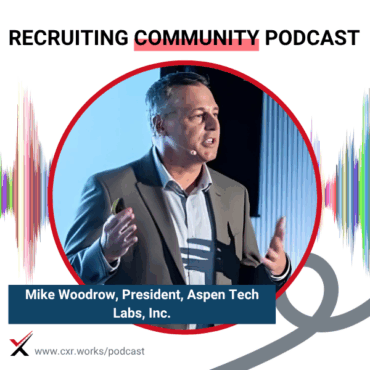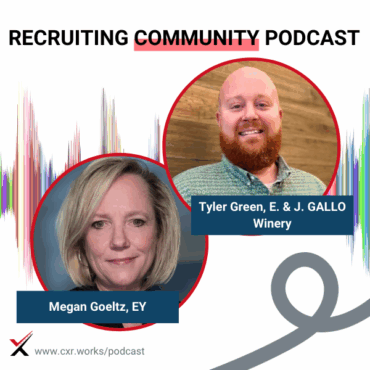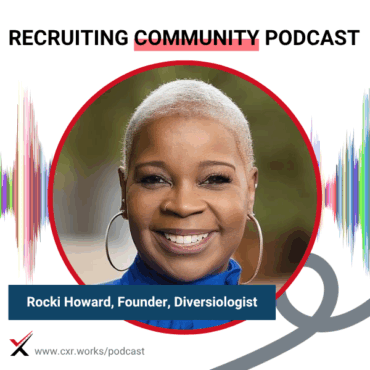
New Approaches to Diversity & Inclusion
What does real DEI look like in recruiting? Rocki Howard shares how leaders can move from intention to impact—and build inclusive cultures from the inside out.
 play_arrow
play_arrow
Balancing Strategy and Tactics: Melissa Thompson’s Career Crossroads Cami Grace
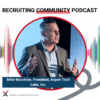 play_arrow
play_arrow
Real-Time Jobs Data and the TA Advantage Cami Grace
 play_arrow
play_arrow
20+ Years at Dell and Beyond: Jennifer Newbill’s Career Crossroads Cami Grace
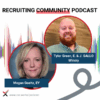 play_arrow
play_arrow
AI Interview Research Cami Grace
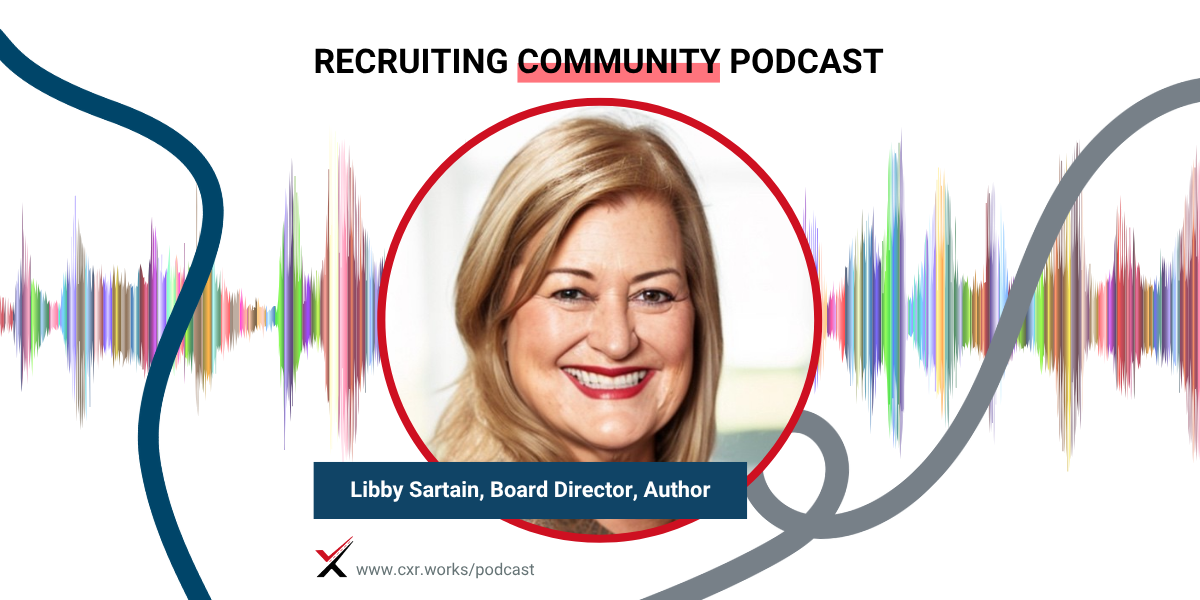
Chris Hoyt
I know we just talked about this a little bit and we’re on by the way, but as luck would have it. Kids got a cold day from school if you’re in if you’re in Texas, you’re aware of what a cold day is. But I guess it’s just too darn cold to go to school today. And Libby, you are set you’re almost neighbor. You’re almost a neighbor to me.
Libby Sartain 0:18
Yeah, not too far away. And it is 25 degrees at my house and uh. It was a windchill of you know, zero or something this morning, very cold. I took my trash out and I almost died.
Gerry Crispin, CXR 0:34
For me, for me, it’s warmer. And probably I’ve been warmer than Austin for a while. But you know, New York’s near enough to New York City. I’m on Long Island. We’ve got the first two inch, two inches of snow that we’ve had. That’s more than a dusting in 700 days. So you know, there’s not a lot going on here. We’re starting to think about planting palm trees. You know, but, but for the moment, for the moment, I’m enjoying the first winter weather.
Libby Sartain 1:04
Oh, good.
Chris Hoyt 1:07
You can have our winter weather if you’d like it. Nobody moved to Texas to be cold.
Gerry Crispin, CXR 1:14
No, thanks.
Libby Sartain 1:15
Although I wish we could split the difference and have some of this in the summer, you know, 20% a day or something.
Chris Hoyt 1:21
Now there’s a committee I would join. How do we figure that out? Yeah. All right. Are we? Are we ready to talk a little bit about giving back? Let’s do it. Okay, here we go.
CXR Announcer 1:38
Welcome to the CXR channel, our premier podcasts for talent acquisition and Talent Management. listen in as the CXR community discusses a wide range of topics focused on attracting engaging and retaining the best talent. We’re glad you’re here
Chris Hoyt 2:09
all right. There we go. We got a little bit of delay, something going on. So it might be it might be interesting today. A little technical difficulties with our host this morning. But that’s okay. We’ll jump right in. I’m excited to welcome you to recruiting community podcast we do this weekly, and I’m gonna bring in and for those who don’t know me, my name is Calvin and I’m bringing in my co host, Mr. Hobbs, Mr. Hobbs, how are you?
Gerry Crispin, CXR 2:33
Just dandy? There’s there’s too many too many of these. We’re gonna have to sort them out at some point.
Chris Hoyt 2:43
So when you say too many of these Did you did you know, this is our 400th podcast.
Gerry Crispin, CXR 2:49
Oh my God. Yeah,
Chris Hoyt 2:51
That’s a little bit of a milestone. Right.
Gerry Crispin, CXR 2:53
It’s a good milestone. I like it.
Chris Hoyt 2:55
Yeah, we’ve done 400 of these. So like, I guess so Gerry. If I gave you a 400 year old bottle of wine
Gerry Crispin, CXR 3:04
400? I don’t think so. That’s cork a slightly corked?
Chris Hoyt 3:12
Are you? Are you saying we may be past our sell by date?
Gerry Crispin, CXR 3:14
Oh, no. That’s yeah, I don’t I don’t think we’d go back. 400, to the first one. What did you like your first and second one that you did?
Chris Hoyt 3:24
The podcast?
Gerry Crispin, CXR 3:25
Yeah. Do you still have them somewhere?
Chris Hoyt 3:28
But we do, no the first podcasts were terr. We were reading. We were reading blog posts. I think initially, it was not it was not good.
Gerry Crispin, CXR 3:40
No. So So yes, it keeps evolving is the point. And so we’re really you know, we haven’t yet peaked.
Chris Hoyt 3:49
Well, like that. So we’re not like a 400 meter dash either. So like, you know, the hard hard sprint, and we’re done. With there’s more got more to go more than we can do. Okay, well, that’s true. And today’s guest is a really easy example of that. I am excited to welcome his first time that she’s been on the show we’re going to bring her in. We’re going to talk about that idea of when you hit a certain age, in your career, or certain your career I think you really start thinking about what’s next. Or maybe what your what your final move is or do you take it to the leadership role do you consult Do you buy boat? Do you sail away do all these things right? And no better person to come in and talk a little bit about what that means than our guest today but really quickly because a little bit of housekeeping. We are streaming live on the YouTube, the Facebook, the LinkedIn. If you are with us on LinkedIn, however, you can jump into the chat and say ‘hello’. You can also ask questions be part of the show. We’re happy to throw you up on the screen. If you ask something and we get engaged there. You can also introduce yourself to anybody there so we’d really encourage you to get on LinkedIn channel watch that. But you can also watch it obviously on YouTube Facebook, if you want to know what podcast shows are ahead. We are actually scheduled out through, I think into May, if you’d like to know what’s ahead or watch any of the historic, I guess they’re historic and 400. But what the old shows you can go to see it CXR dot works slash podcast and can check that out, remind also we are ad free, this is a labor of love. So nobody pays to play, nobody pays to get on here pays to get announced, you’re on here, because we think you have something kind of interesting to say. And then lastly, I think Gerry, we would just remind everybody of cxr.org/directory, where our membership body of about 4500 members and alumni have come together to build and sort of design and execute and deliver on this really fun directory of HR and TA technology in the space. And all of them are able to drop in ratings. And we think what there’s some really neat differentiators here, between you know, the bigger products like a G two or the bigger platforms like that, where they can actually go in and add these ratings and connect with each other directly. And there’s a number of other social elements in there that stay within the confines of that membership, that trust that’s been established, but we’d encourage folks to check that out. Because it is the members have built it. It’s what do you think, Gerry? Five years, I think maybe we’ve had it
Gerry Crispin, CXR 6:12
Five years growing? Yeah, and continues to grow and evolve. But you know, it’s, it’s an opportunity for peers to really engage one another about what they’re using. And what what works. What doesn’t?
Chris Hoyt 6:23
Yeah, I mean, it started a spreadsheet just a handful years ago. So it’s kind of interesting to see where it’s gone now. And they’re they’re actually working on, the team’s putting some together a visualization of the ratings. So we’re excited to maybe look at that in a couple of months. That’ll be a lot of fun. Playing with it. All right, so we will jump right in. I’m super excited to welcome on, let me pull her out of the green room. There we go. Let’s see if that’s working now. There she is. Libby, welcome to the show.
Libby Sartain 6:50
Good morning. Good to be here
Chris Hoyt 6:54
Hi, we have a there’s a little bit of a lag there. So we’ll we’ll get it sorted out. But Libby I’m so excited to have you here. Not just because your friend and you live not too far. It’s not like we have tea every morning. But you are you are pretty close neighbor. In kind of in the hood, the area just outside of Austin, where we live, but you are quite a Titan, you’re quite a force to be reckoned with in the space. Yahoo. Southwest Airlines, I think most recently, you got named if I’m not mistaken, you got named 2023 Most Influential Corporate Board of Directors by Women’s Inc. Magazine. And today. You’re you’re currently the Chairman of the Board still at AARP. Right?
Libby Sartain 7:36
Chairman of the Board at AARP Foundation, and on the board of AARP. And I’m one of the 100 Most Influential Women, Corporate Directors, not the only one. So just I don’t know how many there are. So I don’t know how impressive that is or not.
Chris Hoyt 7:54
Well, I’m impressed. I’m pretty impressed. I think we’re tough to impress. So we’re glad you’re here. Look, for those who have not had the just the joy of connecting with you in person or who really maybe haven’t heard of you. Why don’t you give us Libby? A little bit of an escalator pitch about yourself, and why? Why folks tuned in today should be listening to what you have to say.
Libby Sartain 8:16
Well, I’m almost as old is Gerry. So that’s some, that’s good. And another interesting fact is I was with him when he bought his first hat. So that’s very important. But I have been part of the HR profession, literally, from the back office, to part of management to the C suite, and finally to the board room. And that is something that when I was back in the back office, I didn’t really think I would see in my career. So that’s that’s been very exciting and a little bit I’m a little envious of people in the field right now. Although I think it’s incredibly difficult and challenging. I think the challenges are much more impactful than we’ve had before. So I love that and I joined my first public board 17 years ago and I have you enjoyed that work very much as I do a lot of HR related things and that work so it’s all enjoyable and I have more free time. And I’m still working even though I might be considered past retirement age by some not not many though.
Gerry Crispin, CXR 9:29
I wish I had known there was a retirement age.
Chris Hoyt 9:36
I wish I’d known the hat story Gerry would have had to I assume you Do you still have the hat? I do. We shouldn’t we should have brought it in you should have worn it I
Gerry Crispin, CXR 9:44
I didn’t think of
Libby Sartain 9:46
It was really a fluke we were in New Orleans for I think it was SHRM something or other and the SHRM conference was lunch and Gerry said let’s walk down the street and then he bought a hat.
Gerry Crispin, CXR 9:46
I bought I bought a hat, I went into the, you know, the SHRM conference and somebody came up to me and said, gave me the story that that someone was looking to provide some consulting to either myself or someone else. And and that they they mentioned that hat that both of us are here. And then they pointed to me because they could see the hat. About five, five minutes later, that person showed up. And I got the consulting contract. So I figured, you know, cost of doing business,
Libby Sartain 10:25
Lucky hat
Chris Hoyt 10:33
Are the hats that hats are the bind like, it’s not, it wouldn’t be the last time someone would be looking around a conference room floor or at an event or venue, it’d be like, just look for the hat. You’ll see the guy in the hat and then identifies you, it’s become like that. Right that I like an almost iconic.
Libby Sartain 10:58
Yeah that’s great.
Chris Hoyt 11:01
There’s Gerry’s origin story. It’s fantastic. Well, so So let’s set the stage really quickly for sort of like what like, what’s next? Right. So you have been? You’ve been advising Libby since like, 2008? I think, but But when did you? When did you decide that that you were going to do something different right, than the suite? The C suite roles, not necessarily when you made the departure? But was there a point at some point in your career earlier than than that, that movement where you decided I’m gonna give back? I’ve got enough, stored up here, I’ve got enough wisdom, enough knowledge, enough energy that I want to continue to give back, even though I don’t want to necessarily be in a corporate chair anymore. Was there? Was there a turning point for that for you?
Libby Sartain 11:51
I think it was more of an evolution than, you know, a tipping point or a turning point. But I had the great fortune of starting my career in Dallas, where there is a great sense of giving back in the business community. By the way, I did not find that in the Silicon Valley at all, I think it’s gotten a lot better. But if you were a corporate citizen, you were expected to be a good community citizen. And I had a CEO who had put me on a fast track program with a group of 30 or 40 other people and he said, If you want to be somebody in the business world, you need to be part of the Nonprofit world in Dallas, and so he had me, I was like, Oh my God, you had me run the United Way campaign and call on CEOs and get their commitments instead of him. But I that you know, but it was a great exposure and experience. And then he put me in a leadership program called Leadership Dallas, and I eventually did one called Leadership Texas, but that that was all part of getting ready for Nonprofit leadership. So I became the chairman of SHRM, I was active in my local ASPA chapter, which we came SHRM since I was a student, so it was in my DNA. But I became the chairman of SHRM in 2001, which is a very interesting year. And it’s very interesting from many ways, but that started my work on boards and work on nonprofit boards. So I had in my DNA, that part of me is always going to give back. And then you look at your life, and you think of, you know, what do you want to do at your life, and at some point, you realize, it’s time to give back or what some would call create a legacy. And so about the time I turned 50, that’s I started thinking about that. I wrote a book that kind of told about our job, I did HR, I’ve written several co written them, not all of them, but people convinced me that I had a certain message in the field, and that I should get it down on paper. And I did that. And then I started thinking about what I could do next. And luckily, I worked for a company where I got some very good stock options. So I had flexibility to not work full time for the rest of my life. But if you have a couple of public board gigs, it’s not a bad income, and it’s a lot more flexibility. And, you know, I kind of have in my life now I’m trying to spend 1/3 on personal family 1/3 on professional and 1/3 on giving back. And so my AARP and my AARP Foundation are all volunteer there, they’re giving back. But I’m on the board of Manpower Group, which is a paid gig, but I’ve been on several other public boards where I was paid very nicely. So anyway, I just evolved into it, but I had the flexibility to which not everybody has. And you know one thing that I’ve learned through AARP because we discuss how you live your best life after 50. That’s one of our goals, and the Baby Boomer generation and those who come after us, we’re not going to get a gold watch and buy a boat or play golf. That’s not who we are. And that’s not how people want to live their life anymore. So I think the important thing is to figure out what really drives you, what’s important to you and by the way, I tried a lot of things that I didn’t like. So when I was in this space, including consulting Gerry, I don’t know how you do it, but it was.
Gerry Crispin, CXR 15:28
We needed we gave, we gave a consulting, we gave the consulting up when we started the community. So yeah, you’re right. You see, consulting is not a fun thing.
Libby Sartain 15:40
No, no. But so so I think it’s really about knowing your values, what you stand for, and what’s important in your life. And that’s, that’s been part of me.
Gerry Crispin, CXR 15:52
But but you know, Libby, though, the one thing that hits me over and over again, too, is you started early, getting involved staying involved. I mean, so I because I know, in the 90s, I met you, when you were I guess you were Chair of the Comp Committee, or something like that one of those. And I wish I had just become a member of the recruiting committee, at cetera. But we met and I recognize that, you know, at that point, you’re beginning to develop a leadership role in in where we go with the profession. And I think you became for a lot of people with that, and what you were doing in Dallas, I know, you had a women’s group that you you hung out with, and you guys would, you know, get together on occasion. But, but, but fundamentally, you know, you became a role model, but you were walking the talk at a at a level that you had easy access to, and then it’s a matter of saying, Well, if I can do it here, I can do it, you know, at the national level. At SHRM, I can do it over there. And and the contrast for me and then I’ll shut up is, but the contrast for me is almost every week, Chris, and I will hear something from someone who’s in their 50s. Typically going, I just need 10 more years doing what I’m doing. And I’m doing. That’s your first mistake. You know, is why were you Why were you narrowing your focus, hoping to just hang on by your fingertips to do the same damn thing you’ve always done. First of all, that kind of attitude doesn’t make me feel like I want to hire you for that. I really want to hire somebody who’s a much more enthusiastic and engaging about changing things, as opposed to just doing what I’ve always done for the next 10 years. And so I think at some point, we have to in kind of empower people to start thinking broadly like you began doing well, and maybe AARP could do something there. I don’t know
Libby Sartain 18:02
Well two things, I would comment to what you just said, um, back to when I was chair of that SHRM comp and benefits subgroup, whatever it was, was the time that Hillary Clinton was trying to orchestrate the Health Care Act when Health Care Reform. And so our committee was charged with coming up with terms position on what we would support and what we would not support. And I became so interested in how big that was and how it could really change the world and change people’s lives. And I had access to the SHRM research, research and resources to help us figure out what’s on the table. And what what what would companies benefit from and what would be horrible for corporations. And that got me very interested in this sort of where everything lies between advocacy, and governmental programs and community programs and what companies can do. And that really did drive me to think you could do something big here. So that was part of that really formation. But another thing not to be morbid at all, but it’s important. My dad died of cancer when he was 70. And he was working when he got cancer and on his deathbed, he made me promise to retire early, because he’d saved up his money to travel with my mom. And he didn’t get to do it. Well, fast forward. My husband died suddenly at age 70, 2 years ago and thank God, I retired at 55. And we spent 15 years having the flexibility to travel and I thank my dad for that. I don’t know how it happened. It’s sad, but it’s something everybody should think about. Because if you take that 10 or 15 years, and you work every day of your life, did you really enjoy your life? And I think that’s what’s really important.
Gerry Crispin, CXR 20:00
I think yeah, that that fits very much into the fact that you said you didn’t try to think in terms of doing 1/3 of your time giving back 1/3 of your time, so professional and so on. And I’ve heard that from a few other leaders something to the fact that you shift the balance of, of how you want to spend your life as you age and mature, to be more reflective of you know, how you want to live your life now, and I feel the same way. It’s, that’s fabulous.
Chris Hoyt 20:32
Libby Libby, can you can you share maybe how folks are watching listening how the skills and experiences you had for roles, you know that those skills experiences, you got to roles like Yahoo and Southwest Airlines, how maybe those equipped you for your current role, whether it’s independent board director, or as quite frankly, leader in the space, like what skills maybe you think are are crucial for those, those leaders who maybe want to transition into board roles could be?
Libby Sartain 20:59
Sure, well, the first thing I would say about corporate boards is about a fourth to a third of the work of a corporate board is related to HR. So there’s executive compensation, and most boards have expanded their comp committee to be the, at both Yahoo and AARP, it’s the people, compensation and people, culture, and compensation committee. So committees on the board are looking at culture, they’re looking at talent management, human capital issues, along with compensation. And of course, I chair I have chaired three corporate compensation committees or with other names. But that that works very important. And then there’s succession planning, that’s part of the board, which is very much HR related. And then when you look at things like mergers and acquisitions, and all of the cultural issues that come up with that, you may not be the one that opines on how we should finance our fund the acquisition, but you might be the one who helps figure out is this a good match for us? And if it is business wise, how do we make it work with the talent and the people? And also, as you’re planning your strategy, do we have the right talent on board to accomplish and the right leadership because that’s a real important role when you advise the CEO on that to make sure we can deliver what we want to do. So those are those are important. When it comes to what you want to give back on in your community, I think you need to go with where your interests are. For, for example, I didn’t join any board that I didn’t love their product and use their product. So Manpower is a talent management company. I totally get that right. And they have a lot of different products and services in the full spectrum of talent management, and I use some of them and was familiar with them. So that’s a logical match. I went to work for Shutterfly, which is a product I love to use. I loved photos and putting together photo albums on their board. And I went, I was on the board of Peet’s coffee and tea, which happened to be the brand of coffee that I drink so and still do to this day. Major Dickinson’s. It’s wonderful. But anyway, you when somebody would call me and say, Do you want to be on the board of this oil and gas pipeline that makes us coding that coats the pipes. I just couldn’t see myself getting too excited about that. And I may pass on that opportunity. When AARP came along, what really struck me is their main goals can be summarized in an elevator speech of AARP focuses on health, wealth and self of the 50 plus population. Well, that’s what I did in HR I was comp and benefits. And that was health and wealth and Southwest on fulfillment of your career or accomplishment in your career. And the most exciting thing for me, was helping people determine their career paths and get on the right skills and background to get on the path that they wanted. And I loved it when I found the right person with the right mix of talent and skills for the right role. It just there’s nothing more exciting than you have got the absolute right person the absolute right job, it’s just fulfilling. So those are those are the kinds of things we work on. And the goal of AARP Foundation is to end senior poverty which is very prevalent, and I’ve learned a lot about it because sadly so many seniors have not there, they rely on Social Security only if they had that to retire. And you know, I spent my whole life making sure I still get letters from people from Southwest Airlines. I’m retiring for Southwest today I have millions in my 401 K and profit sharing because when I was a ramp agent you made me But 1% and the 401 K, and you’ve made me promise every time I get a raised but another 1%. And now I have $2 million. Thank you, you know, that’s a very exciting letter to get. I get their emails now or LinkedIn usually, but I don’t even remember them sometimes. But don’t thank me for that. So it’s wonderful.
Chris Hoyt 25:20
I love that, right. So I love that I love the connectivity, though, like your passion for a particular product or service tied to that, that I guess that service that you’re going to pay for it. I think that’s that’s a pretty significant call out. Because we do. I mean, Gerry wasn’t exaggerating when he said, we do get TA leaders who come to us almost on the weekly and who say, I’m 50 Plus, you know, do I take one more role that does x in my career that I never got to do? Do I go to a start up? Do I do a transformation gig? Do I do whatever? Or do I look at boards? How do I find a board to be on? Where do I even start with that? So I mean, I think when you hit 50 Plus, I think there is a legacy component speaking is over 50 There is a legacy component of like, what’s what’s really for you? What am I baby? 50?
Gerry Crispin, CXR 26:12
Yeah, yeah, you are.
Chris Hoyt 26:13
I think it’s pretty powerful. So you mentioned . Right, and that the next phase of somebody’s career, so at the risk of this being kind of a really basic question. Can you sort of blow that out a little bit? Like, what would you say what giving back giving back means that like a leadership level, or maybe how it could shape a careers trajectory?
Libby Sartain 26:39
Well, I can’t even imagine how I would have succeeded at anything I did in HR without all of my relationship and association with the professional associations primarily SHRM over the years because I participated. And I lead and I contributed to a lot of things, but I learned much more, I had access to resources, and trends, and people and that’s the most important thing, that network that you call when, what do I do now? Remember, I called Gerry’s like, Hey, there’s this internet thing, we need to learn how to recruit on it. Can you help us? I mean, that’s like, you know, I’m sure he did. And so, you know, that’s so important to, to your career is that you’re always learning and growing. And so I think all of the giving back, you should be focusing on something that’s pushing you and helping you learn and helping you grow. And that’s how I feel about AARP and, and Manpower. I’ll be honest, but I just keep, you know, it’s like when you do I did a lot of speeches, that’s another thing that when you speak, when you speak, you have to be prepared. So you have to learn. So all of this speeching speaking made me learn more. And so there’s nothing that I’ve thrown myself into that hasn’t made me better at what I do. I think
Chris Hoyt 28:13
I think that probably speaks more about you than it does the things you throw yourself into though if I’m being honest.
Libby Sartain 28:19
I don’t know maybe maybe
Chris Hoyt 28:22
well, Libby
Gerry Crispin, CXR 28:23
Attitude we all have to have I mean if you’re not curious if you’re not engaged if you’re not willing to reach out to other people not so much to you know, tout your own horn but to learn from them. That kind of that kind of behavior I think is probably foundational for for how you’re going to grow and expand where you’re where you might go next.
Libby Sartain 28:52
Yep.
Chris Hoyt 28:55
So Libby I’ll ask you we ask all our guests before we wrap up if you were going to write another book today about this topic, what what would you title that book
Libby Sartain 29:14
Maybe A Life Well Lived. That’s the first thing that popped into my mind but yeah.
Chris Hoyt 29:20
As good as any we’ll will take.
Libby Sartain 29:25
The sub the sublime and something else bigger in front of it, you know, I don’t know.
Chris Hoyt 29:30
It’s a start Bigger, bigger font law so present company excluded. Who would get the first signed copy of your book?
Libby Sartain 29:45
Maybe I would give that to a lot of people who I would give it to are no longer with us is the sad part. As you age maybe would very top on the list would be Colleen Barrett, who was my boss at Southwest Airlines.
Chris Hoyt 30:03
Oh, yeah, love that stuff. Well, Libby, we so much gratitude. Thank you so much. I know you’re super busy. You’re doing all the things. And we’re just super grateful that you could make the time to join the show. Give us a little bit of that wisdom. And we’re gonna have to we’re gonna have to book another breakfast out at our favorite diner soon.
Libby Sartain 30:24
Yes, we will. That’ll be fun.
Chris Hoyt 30:28
All right. Well, thank you very much, Libby. I’m gonna put you in the greenroom. Don’t go anywhere. Hang out until till after the bumper for us. We’ll ya
Libby Sartain 30:35
Okay. I will.
Chris Hoyt 30:35
Alright, everybody tell everybody Goodbye,
Libby Sartain 30:36
Goodbye, everybody.
Gerry Crispin, CXR 30:38
Goodbye, everybody.
CXR Announcer 30:44
Thanks for listening to the CXR channel. Please subscribe to see XL on your favorite podcast resource and leave us a review while you’re at it. Learn more about CXR on our website CXR dot works facebook.com and twitter.com/career crossroads and on Instagram at career X roads. We’ll catch you next time.
Title:
From CHRO to Boardroom: A Life of Leadership & Service
Featured Guests:
Libby Sartain, Board Chair, AARP Foundation; Former CHRO, Yahoo and Southwest Airlines
Hosts:
Chris Hoyt, President, CareerXroads
Gerry Crispin, Principal and Co-founder, CareerXroads
Episode Overview:
Libby Sartain joins the CXR podcast to reflect on her career journey from HR leadership to board service and community impact. A former CHRO at Yahoo and Southwest Airlines, Sartain shares how her professional experience shaped her passion for giving back—particularly through nonprofit and board involvement. She offers practical advice for HR leaders considering a pivot toward purpose-driven leadership and long-term legacy.
Key Topics:
Transitioning from the C-suite to board and community service
How HR experience translates to nonprofit and corporate board value
Building a career legacy through mentorship and community involvement
The role of curiosity and lifelong learning in leadership
Encouraging early and meaningful civic engagement
Aligning personal passions with board and service work
Planning for a “third act” with purpose and flexibility
Notable Quotes:
“About a third of board work is HR-related—executive comp, culture, succession planning, and talent strategy.” — Libby Sartain
“If you’re not curious, engaged, and willing to learn from others, you’re not setting yourself up for growth.” — Gerry Crispin
“Everything I’ve done to give back has made me better at what I do.” — Libby Sartain
“Giving back should push you to learn and grow.” — Libby Sartain
“A life well lived is one where you made a difference.” — Libby Sartain
Takeaways:
Leadership is not a finish line—it’s a platform for giving back. Libby Sartain’s journey shows how HR leaders can use their expertise to influence policy, mentor others, and support meaningful causes beyond the corporate world. Planning early and aligning personal purpose with professional impact helps create a legacy that lasts.
Want more conversations like this?
Subscribe to the CXR podcast and explore how top talent leaders are shaping the future of recruiting. Learn more about the CareerXroads community at cxr.works.
Chris Hoyt: Just talked about this a little bit, but as luck would have it, the kid’s got a cold day from school. If you’re in Texas, you know what a cold day is—but I guess it’s just too darn cold to go to school today.
And Libby, you’re almost a neighbor to me.
Libby Sartain: Yeah, not too far away. It’s 25 degrees at my house, with a wind chill of zero or something this morning. Very cold. I took my trash out and I almost died.
Gerry Crispin: It’s actually warmer here in New York than in Austin, which is rare. On Long Island, we just got our first real snow in over 700 days. We’re starting to think about planting palm trees. But for now, I’m enjoying the winter weather.
Libby Sartain: Well, good!
Chris Hoyt: You can have our winter weather if you’d like it. Nobody moved to Texas to be cold.
Libby Sartain: Although I wish we could split the difference and have some of this cold in the summer—maybe 20% of the day?
Chris Hoyt: That would be nice. Now there’s a committee I’d join. Let’s figure that out.
Are we ready to talk a little bit about giving back?
Libby Sartain: Let’s do it.
Announcer: Welcome to the CXR channel, our premier podcast for talent acquisition and talent management. Listen in as the CXR community discusses a wide range of topics focused on attracting, engaging, and retaining the best talent. We’re glad you’re here.
Chris Hoyt: A little bit of a delay this morning—technical difficulties with the host—but that’s okay. We’re jumping right in.
Welcome to the Recruiting Community Podcast. We do this weekly. For those who don’t know me, I’m Calvin, and I’m bringing in my co-host Mr. Hobbes. How are you, Hobbes?
Gerry Crispin: Just dandy.
Chris Hoyt: There are too many of these—at some point, we’re going to have to sort out all the characters.
Did you know this is our 400th podcast?
Gerry Crispin: Oh my god! That’s a milestone. I don’t think we want to go back to the first one though…
Chris Hoyt: The first podcast? No—we were just reading blog posts. It was not great.
Gerry Crispin: But it keeps evolving. We haven’t yet peaked.
Chris Hoyt: We’re not a 400-meter dash—we’ve got more to go.
And today’s guest is a perfect example of that.
Quick housekeeping: We’re live on YouTube, Facebook, and LinkedIn. If you’re with us on LinkedIn, jump into the chat, say hello, and ask questions—we’ll throw them on screen. You can also visit cxr.org/podcast to check out past and future episodes.
And remember: this is an ad-free labor of love. Nobody pays to be here. Our guests are on because we think they have something interesting to say.
Also, check out cxr.works/directory. Our membership—about 4,500 members and alumni—have built a TA and HR technology directory. Members can add ratings, connect with others, and share insights. It’s been growing for about five years now.
And we’re working on adding some cool visualizations to it. So, stay tuned.
Now let’s bring in today’s guest. I’m super excited to welcome Libby Sartain.
Libby Sartain: Good morning!
Chris Hoyt: Libby, we’re thrilled to have you. Not just because you’re a friend and live nearby, but because you’re a titan in this space. You’ve held roles at Yahoo and Southwest Airlines. Most recently, you were named one of the 2023 Most Influential Corporate Board Directors by Women’s Inc. Magazine. And you currently serve as Chair of the Board for AARP Foundation, right?
Libby Sartain: Yes—Chairman of the Board at AARP Foundation and on the AARP board as well. And just to clarify, I’m one of 100 most influential women corporate directors—not the only one!
Chris Hoyt: I’m still impressed. For those who haven’t had the chance to connect with you, give us the quick Libby Sartain elevator pitch.
Libby Sartain: I’ve been part of the HR profession from back-office roles to the C-suite to the boardroom. I never imagined I’d see that progression in my own career, but I’ve had a front-row seat to the evolution of HR. I joined my first public board 17 years ago and have loved the work—especially the HR-related aspects.
Now I split my time: one-third on personal/family, one-third on professional, and one-third on giving back. And even though I might be past the traditional retirement age, I’m still working.
Chris Hoyt: I wish I’d known the story about your hat, Jerry. You still have it?
Gerry Crispin: I do! I bought it in New Orleans during a SHRM conference. Someone spotted me because of it and I ended up landing a consulting contract. It became my trademark!
Libby Sartain: I was with him when he bought that hat! We just walked down the street and he picked it up.
Chris Hoyt: I love that story—Jerry’s origin story. The hat is iconic now.
So Libby, let’s set the stage. You’ve been advising since about 2008. But when did you really decide to step away from the C-suite and do something different—something that allowed you to give back?
Libby Sartain: It was more of an evolution than a turning point. I started my career in Dallas, where community involvement was expected of business leaders. I had a CEO who encouraged me to lead our United Way campaign and join leadership programs like Leadership Dallas and Leadership Texas.
That exposure was invaluable. I eventually became Chair of SHRM in 2001, which was an eye-opening experience, especially working on public policy issues like healthcare reform.
Around age 50, I started thinking more about my legacy. I had some financial flexibility thanks to stock options, so I didn’t need to work full-time anymore. Instead, I focused on things I was passionate about—public boards, community organizations, and personal growth.
Gerry Crispin: You started early with involvement. By the ’90s, you were already making a name for yourself in the profession. You became a role model for many.
And now, we often hear from people in their 50s saying, “I just need 10 more years of doing the same thing.” That’s the wrong mindset. It makes them less hirable, frankly. We need to encourage people to think bigger and broader.
Libby Sartain: I agree. Also, my father died of cancer at 70. He had planned to travel in retirement but never got the chance. He made me promise to retire early. My husband passed suddenly two years ago, but I’m so grateful we had 15 years to travel and enjoy life together. That perspective really matters.
Gerry Crispin: That resonates deeply. It’s about shifting how we spend our time as we age—focusing on what truly matters.
Chris Hoyt: Libby, can you share how your skills from roles like Yahoo and Southwest equipped you for board work? What should leaders be developing now if they’re eyeing future board opportunities?
Libby Sartain: About a third of board work is HR-related—executive comp, culture, succession planning, and talent strategy. I’ve chaired compensation committees and served on people and culture committees.
When considering nonprofit or board roles, choose organizations aligned with your passions. For example, I loved using Shutterfly, so I joined their board. I drank Pete’s Coffee, so I served there too.
AARP’s focus on health, wealth, and self for the 50+ demographic aligns perfectly with my career in comp, benefits, and helping people find fulfillment at work.
At Southwest, I often pushed employees to contribute to their 401(k) and profit sharing. Years later, I get messages from people thanking me for helping them retire with millions. That’s rewarding.
Chris Hoyt: That’s powerful. You mentioned giving back—what does that really look like at the leadership level?
Libby Sartain: I couldn’t have succeeded in HR without being part of professional associations like SHRM. I learned more than I gave, and I built a network I could rely on for anything.
Giving back should also push you to learn and grow. That’s how I feel about my work with AARP and Manpower.
Speaking also helped—I had to prepare, which forced me to keep learning. Everything I’ve done to give back has made me better at what I do.
Gerry Crispin: If you’re not curious, engaged, and willing to learn from others, you’re not setting yourself up for growth.
Chris Hoyt: Libby, we always ask our guests: if you were going to write a book about this topic today, what would you title it?
Libby Sartain: A Life Well Lived.
Chris Hoyt: I like that. And who gets the first signed copy—present company excluded?
Libby Sartain: Probably Colleen Barrett, my former boss at Southwest Airlines. She’s at the top of the list.
Chris Hoyt: That’s lovely. Libby, thank you so much for joining us today. We’re grateful for your time and your insights. Let’s book another breakfast at our favorite diner soon.
Libby Sartain: Yes, we will. That sounds fun.
Chris Hoyt: Alright, hang out in the green room for a sec. Everyone else, we’ll see you next week!
Announcer: Thanks for listening to the CXR channel. Please subscribe to CXR on your favorite podcast platform and leave us a review while you’re at it. Learn more at cxr.works, facebook.com/careercrossroads, and on Instagram at CareerXroads. We’ll catch you next time.
Tagged as: AI, Podcast, Leadership.
Chris Hoyt is the President of CareerXroads, a global peer community for talent acquisition leaders driving strategic change. With decades of experience leading recruiting innovation at Fortune 500 companies, Chris now advises enterprise TA teams on tech, process, and leadership. He’s a frequent speaker at conferences like SHRM, HR Tech, LinkedIn, and UNLEASH, and he’s known for pushing conversations beyond buzzwords to get to what really works in hiring. Through CXR, he connects top TA professionals to solve real problems, challenge norms, and shape the future of recruiting.

What does real DEI look like in recruiting? Rocki Howard shares how leaders can move from intention to impact—and build inclusive cultures from the inside out.
